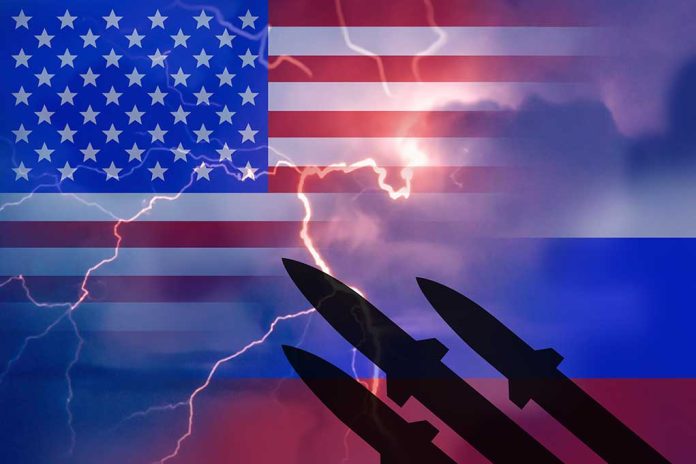
The United States has resumed offensive weapons sales to Saudi Arabia, igniting a controversial debate that encompasses human rights concerns and strategic interests.
At a Glance
- The United States will resume sales of offensive weapons to Saudi Arabia, ending a suspension imposed due to operations in Yemen.
- This decision marks the end of over three years of restrictions initiated over human rights concerns.
- The State Department will handle these sales, ensuring proper congressional notification and consultation.
- This strategic move aims to strengthen U.S.-Saudi relations and counter regional threats, including growing Iranian influence.
- President Biden’s administration previously emphasized a renewed focus on human rights, causing public concern over this policy shift.
A Resumption Fraught With Controversy
The recent U.S. decision to resume offensive weapons sales to Saudi Arabia after more than three years of limitations, has sparked widespread controversy. This policy shift comes in response to Saudi Arabia’s strategic partnership with the United States and its critical role in countering regional threats like Iran and the Houthi rebels in Yemen. However, human rights activists and concerned citizens fear this move could exacerbate human rights abuses in the region.
Critics are quick to point out that Saudi airstrikes in Yemen have significantly harmed civilians, including children. Despite a U.N.-brokered truce held since early 2022 and a noticeable reduction in cross-border fire from Yemen, the fear remains that supplying Saudi Arabia with more high-tech military equipment could ignite further violence.
Strategic Interests vs. Human Rights
The Biden administration initially pledged to limit arms sales to Saudi Arabia to defensive weaponry, emphasizing a commitment to human rights. The recent shift in policy thus represents a significant pivot, raising questions about the U.S.’s role as a global human rights advocate.
“Saudi Arabia has remained a close strategic partner of the United States, and we look forward to enhancing that partnership” – Vedant Patel, State Department spokesperson
Despite assurances by the State Department that sales will proceed with “appropriate congressional notification and consultation,” the administration’s move has reignited debates on its ethical implications. It underscores a potential reprioritization where strategic interests may overshadow human rights commitments.
Saudi Arabia’s Strategic Role
Saudi Arabia’s position as a critical player in the Middle East cannot be understated. The kingdom’s cooperation with the U.S., Jordan, and the UAE recently helped repel an Iranian missile and drone attack on Israel, further strengthening its strategic value to Washington. Moreover, the U.S. hopes that resuming arms sales will push Saudi Arabia towards normalizing relations with Israel, a key foreign policy objective that could alter the region’s dynamics.
“There has not been a single Saudi airstrike into Yemen and cross-border fire from Yemen into Saudi Arabia has largely stopped” – Vedant Patel, State Department spokesperson
Among the myriad geopolitical calculations, Saudi Arabia is seeking further U.S. security guarantees and advancements, such as a civilian nuclear deal, in exchange for normalizing relations with Israel. Israeli Prime Minister Benjamin Netanyahu prioritizes these diplomatic breakthroughs, hoping to bring more Arab states into the fold under the Abraham Accords framework initiated by the Trump administration.
The U.S. move also aligns with broader efforts to counter China’s growing influence in the region and drive a wedge between Saudi Arabia and Iran. However, Saudi demands for U.S. incentives like defense pacts and civil nuclear cooperation could reshape the existing diplomatic and security frameworks in unpredictable ways.
Public Sentiment and Policy Implications
Public sentiment within Saudi Arabia presents another layer of complexity. A recent survey revealed that a staggering 96% of Saudis believe their country should cut off contacts with Israel to protest against Israeli actions in Gaza, highlighting a significant domestic resistance to normalization efforts.
As the Biden administration navigates these treacherous waters, it must balance its regional strategic objectives with its human rights commitments. The resumption of offensive weapons sales to Saudi Arabia signifies a potential rebalancing in U.S. foreign policy, where immediate strategic needs may take precedence.
The unfolding situation requires constant vigilance and measured responses, ensuring that strategic partnerships do not come at the expense of the United States’ core values and ethical standards.
Sources:
- US to resume sales of offensive weapons to Saudi Arabia
- US Resumes Offensive Weapons Sales to Major Human Rights Abuser: Saudi Arabia
- US will resume offensive weapons sales to Saudi Arabia
- US to lift ban on offensive weapons sales to Saudi Arabia
- US To Resume Sales Of ‘Offensive’ Weapons To Saudi Arabia
- U.S. restarts offensive weapons sales to Saudi Arabia after lengthy ban










